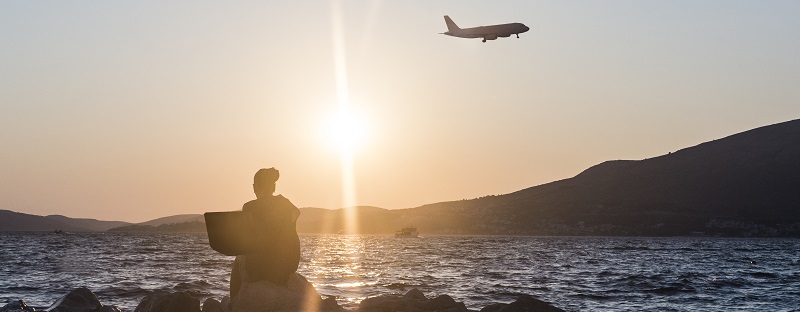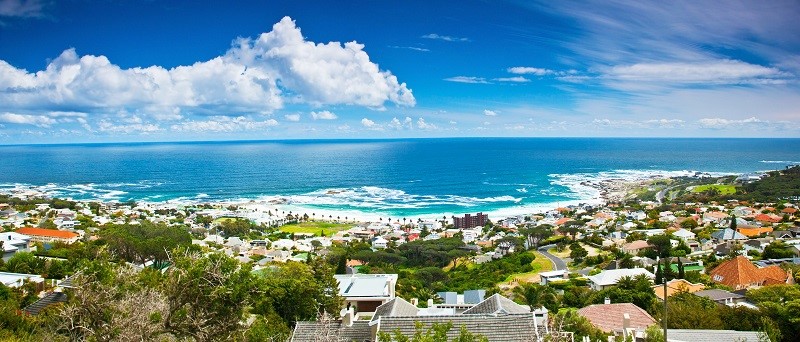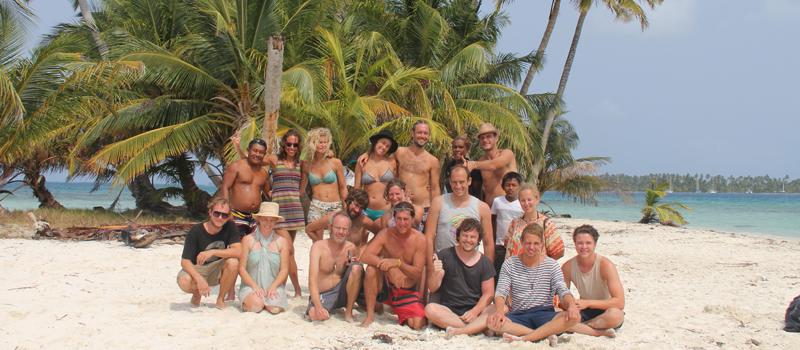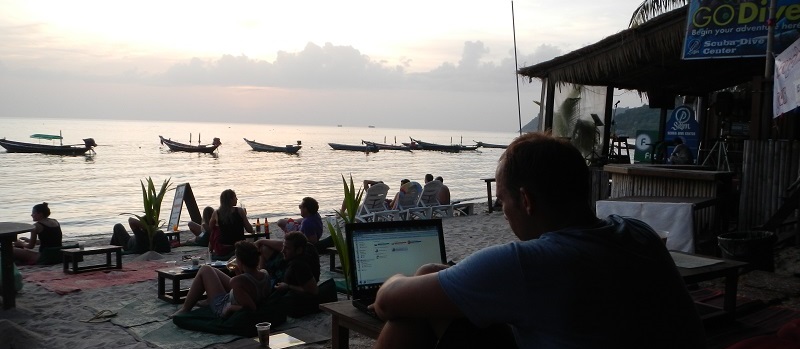Do you do most of your work online and would like to travel more?
Well, with the right preparation you could run your business from anywhere and discover the world’s most amazing destinations at the same time.
Be warned though: Staying productive and being successful is not easy.
If you’d like to learn the most important things you need to know to make this work for you, continue reading. Don’t have the right skills to work online yet, simply follow the advice I’m sharing here.
Working while travelling
Working while travelling is an amazing lifestyle, but it’s not a vacation. In fact, taking your business around the world, if it’s for two month or a year, requires good planning and preparation.
During the last few years I’ve made a lot of mistakes of my own as I’ve travelled the world whilst running businesses. I think it’s important to share some ideas on what you are likely to experience if you choose this amazing lifestyle. While most people think we are on an endless vacation, this is not truth.
Technology has allowed us to live and take advantage of this lifestyle. In fact, these days you could even run your office next to the lions of the Serengeti, in the small jungle towns of Bolivia, or from the beautiful islands of Indonesia. You’ll find a decent internet connection almost everywhere where there are tourists.
Here are some essential things to take into consideration when you are thinking about the work and travel lifestyle.

Prepare your trip, don’t just take off
You could easily get on a plane tomorrow and start work in your dream destination but your chances of success would be very slim. You need to prepare so that your trip will be productive and your bank account healthy. Before you leave you need the right gear; a good, light-weight laptop, an e-reader, extension leads, and any other productivity boosters. You need to arrange your bank accounts, be sure of your tax plan, and have the correct insurance. And you need to tell your clients of your plans, keep them on board, and prepare them for the new relationship.
Max 30 hour work-week
What’s the point of moving to the other side of the world if you can’t take the time to get to know a new culture, make friends, and try out new activities? If you have to work more than 30 hours a week then maybe this lifestyle isn’t for you. Remember that a budget of $1000 a month will go a long way in Asia… and if your clients pay you in a strong currency you could live almost anywhere in the world. Obviously, the more money that you make the better, but don’t sacrifice your work-life balance for a few extra dollars. Just organise your work week in a way that will allow you to be productive, produce quality work, and enjoy the lifestyle of work and travel.

Choose your destination carefully
Choosing a new destination is exciting, the world is your oyster, but you have to do so carefully. Think about your budget; living in countries with a lower-cost of living means more free-time and value for money. Think about what you can do; lying on a beach will get boring after a while. Is there good break to learn surfing? Are there lots of amazing walks near-by? You need to think about what you want to be doing in your spare time and then decide on your destination. Is there a big expat scene? Meeting new people is essential to your happiness while you are away. You also need to think about the needs of your clients. Does the time difference make it impossible to talk with your clients within working hours? You need at least 3 hours of overlapping work time.
Don’t be scared – just careful
One thing that puts a lot of people off this lifestyle is safety. But with the right preparation and research you should have no problem, there are so many exotic destinations around the world that are just as safe (if not safer) than the big European cities. Be sure to ask for advice on online forums, expats actually living the area will have a very good idea of what is going on and the levels of danger. Check official sources as well. If your government advises against travel, it would be silly to go. If you are really not sure, go for thirty days, and have a back-up destination. If you feel safe, stay, and if not, try somewhere else. On general piece of advice would be to not be an obvious tourist, just use common sense and be aware of your surroundings.

Start with a vacation
I always advise against arriving in a destination and starting work immediately. You need to find a rhythm in the new destination, find out where you work best, learn about the people, and know the best places to get a lunch-time sandwich. Take 1-2 weeks exploring the tourist sites, learning about the history and culture and you will feel much more comfortable when you get to work. This is also a good time to decide if you want to stay any longer, and if you do – look for longer-term accommodation, co-working spaces, and get mobile internet. Above all, you should socialise and have fun! Take advantage of your situation.
Socialise – Happiness is best when shared
Your first few days in any destination should be spent around other travellers. Hostels are the best places to do this; they often have very social bars where it’s great to meet all kinds of people from all around the world. You should also take advantage of meet-ups which are organised online. Couchsurfing, Internations, and Facebook groups are the best places to find out about these (often) weekly meet-ups. They can prove very helpful to anyone who is looking for more information about workspaces and accommodation. Also throw yourself into any popular activities that the destination has to offer; learn to surf, salsa dance, or cook tradition meals. This way you can meet people who share your interests.

Be aware of the tourists
Travelling brings you into contact with many awesome people from all over the world. However, one problem is that most of them are on a vacation rather than on aworkation. After two weeks of socialising and getting to know a destination you should start to concentrate on work. The most important thing to do is to learn how to say no! If you need to work in the morning, be strong and refuse a night out on the town. Party smart; go out once or twice a week and enjoy it, but remember that it’s good and productive work which will sustain this lifestyle. This is where many people fail with the work and travel lifestyle. You have to be dedicated to your work and clients or it simply won’t work. The best way to deal with this is to move into an apartment and make friends who also work.
Choose your workspaces carefully
When choosing your workspace it’s important to know where you are most productive. Don’t find one café and work there every day, you may be far more productive at the library. Take a walk around your new destination and try and find the perfect workplace or workplaces for you. Don’t be afraid to change your workplace after two or three hours. It will give your mind a rest and give you a break as you travel.

Accommodation Matters
Where you stay is going to be one of the key ingredients to your happiness and comfort in any destination. For short-term accommodation do your research on websites such as hostelworld.com and hostelbookers.com. These sites offer user generated scores in areas such as comfort, safety, and atmosphere. Nook a maximum of three nights and if you like it you can stay longer.
For long-term accommodation you should never book in advance or give over any money without seeing the place first. If the internet is faulty or it’s in a dangerous neighbourhood you will want to move out and lose money. It’s best to arrange once you are in the city. Walk around and find an area that you like.
Travel slow
Travelling in itself is a part-time job. You have to plan and research each destination and then get settled in once you have arrived. You should travel slow, get used to a destination, and really immerse yourself in the culture. Work and travel is a lifestyle that allows you to do this, so take advantage of it. You should also set yourself goals for each destination. Once you have completed them you can allow yourself to move on. However, if you really don’t like a place, or feel in danger move as soon as possible, then settle for longer in the next destination.
Learn something new and create a work life balance
Beginning your work and travel adventure is a huge step to take, so it should have its rewards. And it does, the main one being that this lifestyle gives you an amazing work-life balance. You will have the free time to explore any hobby that you want to – surfing, yoga, swimming, cooking, learning languages, and many more that are unique to a destination. It’s important that you learn a new hobby because it takes the mind off work, having something else to concentrate on will allow you to come back to your work with fresh eyes. It’s also a great way to meet like-minded people.

Meet other digital nomads
Travelling with other nomads is a great way to travel. Everyone will understand that you have to work in the morning or evening and will not bother you. It’s also awesome to have other like-minded people around who understand business and your lifestyle. You can bounce ideas off of each other, co-work on projects, delegate work according to other people’s strengths, and have an awesome time travelling the world at the same time. Digital nomads also travel slow, so it’s a great way to get to know different destinations with a group of people that you know well.
Learn to delegate
If there is one tip that I can give to you to change the way that you work and travel it’s that you should try to master how to delegate and outsource some of your work and get other freelancers to help you. In fact, the most successful digital nomads that I know (with the most free time) are all into outsourcing. Their best skills are not necessarily programming, web design, or writing but they are masters of delegation. They know how to use the skills of others to their advantage.
If you are not doing it already, start small. Think about the little tasks that are not your strengths, give the tasks to people who are good at it and go from there. Outsourcing is not that easy to master but with a bit of practice you should be able to learn it too and streamline your workload as a result.

Go and improve!
As you can see, if you have an online skill and you are dedicated to this amazing lifestyle, you could work and travel. But remember it’s not a vacation, it’s hard work. You have to be prepared before leaving, settle into a destination, and then produce good quality of work and remain productive while keeping your clients happy. I recommend staying in one destination for a while, so that you can be truly comfortable and have a place to work from. Take trips and explore on the weekends, and find yourself a hobby to take your mind off work and give yourself a good work-life balance.
